Background
Joanna Klink was born in Iowa City, Iowa, United States.

University of Iowa, Iowa City, IA 52242, United States
The University of Iowa where Joanna Klink received her Master of Fine Arts degree.
Johns Hopkins University, Baltimore, MD 21218, United States
Johns Hopkins University where Joanna Klink received her Doctor of Philosophy degree.
Joanna Klink
Joanna Klink
Joanna Klink in her childhood.
Joanna Klink in her young years.




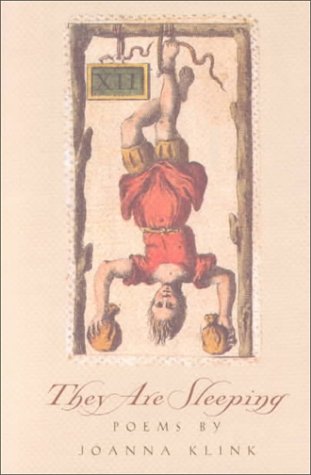
(In They Are Sleeping, Joanna Klink tests the limits of so...)
In They Are Sleeping, Joanna Klink tests the limits of solitude, setting her poems in places where our grip on "self" is loosened and blurred - caves, coastlines, rooms in cities. As her poems lead through these sometimes beautiful, sometimes appalling internal landscapes, characters like the Hanged Man and the Lady of Situations reappear, often locked in misunderstanding but compelling us toward a more fragile and expansive sense of self.
http://www.amazon.com/gp/product/082032275X/?tag=2022091-20
2000
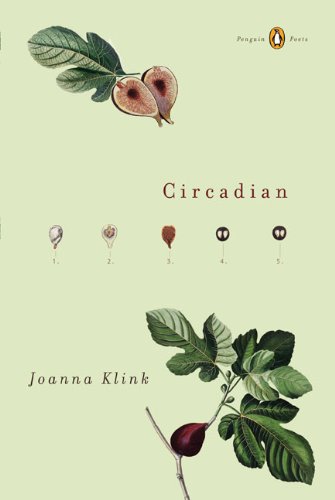
(The poems in Joanna Klink's collection Circadian take as ...)
The poems in Joanna Klink's collection Circadian take as their guiding vision circadian clocks. Moved by the presence and withdrawal of light, these internal clocks influence rhythms of sleeping and waking: the opening and closing of flowers, the speed at which the heart pumps blood, the migratory cycles of birds. With love poems and prayers, Joanna Klink offers patterns of glowing alertness and shared life, patterns that speak to the flickering circuit between inner and outer landscapes, that bind each beating heart to the pull of the tides.
http://www.amazon.com/gp/product/0143038842/?tag=2022091-20
2007
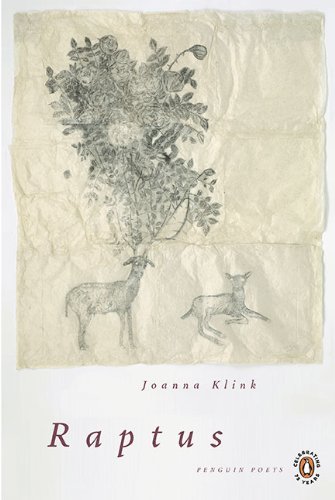
(The linked poems in the collection, Raptus, search throug...)
The linked poems in the collection, Raptus, search through a failed relationship, struggling with the stakes of compassion, the violence of the outside world, and the wish to anchor both in something true.
http://www.amazon.com/gp/product/0143117726/?tag=2022091-20
2010
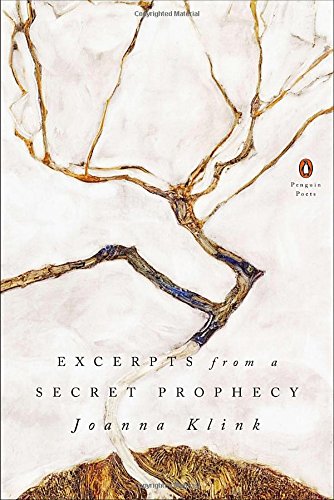
(The poems in Klink's collection, Excerpts from a Secret P...)
The poems in Klink's collection, Excerpts from a Secret Prophecy, offer a closely keyed meditation on being alone - on a self fighting its way out of isolation, toward connection with other people and a vanishing world.
http://www.amazon.com/gp/product/0143126873/?tag=2022091-20
2015
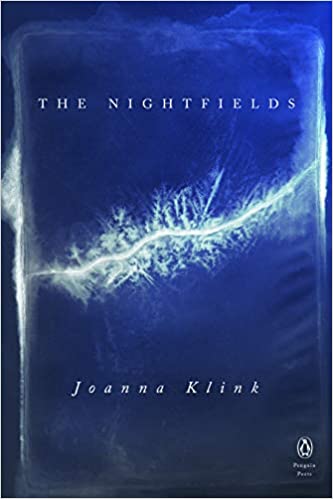
(The Nightfields begins with poems of personal loss - a tr...)
The Nightfields begins with poems of personal loss - a tree ripped out by a windstorm, a friendship broken off after decades, the nearing death of parents. Other poems take on the cost of not loving fully or are written from bewilderment at the accumulation of losses and at the mercilessness of having, as one ages, to rule things out. There are elegies for friends and a group of devotional poems. The Nightfields closes with thirty-one metaphysical poems inspired by the artist James Turrell's Roden Crater, an extinct volcano in Arizona that Turrell has been transforming into an observatory for the perception of time. The sequence unfolds as a series of revelations that begin in psychic fear and move gradually toward the possibility of infinitude and connection.
https://www.amazon.com/Nightfields-Penguin-Poets-Joanna-Klink/dp/0143135392
2020
Joanna Klink was born in Iowa City, Iowa, United States.
Joanna Klink received her bachelor's degree in 1991. Then she received a Master of Fine Arts degree in poetry at the University of Iowa in 1994. Later on, in 2002, she obtained a Doctor of Philosophy degree in humanities at Johns Hopkins University.
Joanna Klink is an author who began her writing career at the beginning of the 1990s. The first book she published was the 2000 poetry collection, They Are Sleeping. In 2001 she joined the University of Montana as an assistant professor of poetry then becoming a professor of English and creative writing. Later on, she left this position. Now, she teaches at the Michener Center for Writers at the University of Texas at Austin. Klink was also the Briggs-Copeland Poet at Harvard University in 2008-2011.
Klink's other poetry collections include Circadian (2007), Raptus (2010), Excerpts from a Secret Prophecy (2015), and the most recent The Nightfields (2020). In each poem from The Nightfields Klink reminds the reader that it is through an opening that people live and that it is in this struggle to open that people are most "wholly alive." She reminds her readers that people are not alone in the struggle to open. In poem after poem, Klink charts the loneliness of time passing and the inevitable loss that comes with it. Klink always manages to be stretching the boundaries of her own world. Her peripatetic poems mirror the moving between worlds that happens in her many lyric leaps. In following her, the reader crosses the boundaries of self.
Klink is also a contributor of essays and poetry to periodicals, including Antioch Review, Boston Review, Verse, Colorado Review, New Republic, Ploughshares, Kenyon Review, Iowa Review, and Prairie Schooner. Her poems appeared in many anthologies, most recently Resistance, Rebellion, Life: 50 Poems Now, and The Penguin Anthology of Twentieth-Century American Poetry.
Joanna Klink is a gifted poet acclaimed for her poetry collections. Her numerous honors include the 2003 Rona Jaffe Foundation Writers' Award and the 2012 Jeannette Haien Ballard Writer's Prize. She is also the recipient of the Civitella Ranieri Foundation Fellowship (2012, 2017), the American Academy of Arts and Letters Fellowship (2013), the Amy Lowell Poetry Traveling Scholarship (2018), the Bogliasco Foundation Fellowship (2018), and the John Simon Guggenheim Fellowship (2019).
(The poems in Klink's collection, Excerpts from a Secret P...)
2015(The linked poems in the collection, Raptus, search throug...)
2010(In They Are Sleeping, Joanna Klink tests the limits of so...)
2000(The Nightfields begins with poems of personal loss - a tr...)
2020(The poems in Joanna Klink's collection Circadian take as ...)
2007Joanna Klink's sense is that the lyric language belongs to anyone who is open enough to receive it. When she reads, she tries to put herself fully into the poem's world as it unfolds before her. When she writes, she tries to put herself fully into the poem's world as it takes shape, as it comes into view.
The books she rereads are Derek Walcott's White Egrets, Djuna Barnes' Nightwood, Loren Eiseley's The Immense Journey, J.L. Carr's A Month in the Country, and Virginia Woolf's To the Lighthouse.
Quotations:
"In poems, I am trying to find my bearings through a world that at times feels remote and inchoate and struck blank with noise. I would like to place myself in a field of deep attention, and out of that attention come to feel and regard with more acute understanding what is there."
"I write to be less hopelessly myself, to sense something more expansive than where I speak from. This at least is my hope. If I could do it in language, I would cross over into a world where isolation falls away and separateness is eased, where there is no need to be numb in order to get by - and every silence is instructive, every perception part of a widening movement of voice and light and air, so that it is possible to be fully there, it is possible to feel the very shape of change."
"I don't have a particular reader in mind when I write. But all of my efforts in writing are towards making a connection with him, with her."
"I don't think of my poems as carrying on a dialogue with a public so much as entering into a dialogue with a person."
"There is always chatter…I want to be able to listen, to be receptive. In the midst of mayhem."
"I'm happy when I'm reading. I would give up writing long before I would ever give up reading."
"Often my impulse is to return to something that has changed me because my spirit is thinning and I want to be transported in exactly the same way I was before. Which never happens. It's beautiful and unsettling - haunting, to keep going back."
"Many poets would quietly agree that the poem they're writing knows more than they do. I don't mean to sound mystical. I just think there is a transport that occurs in writing poetry, and it sometimes allows the poet to see past the shamefulness or loveliness of the given world - to see all the possible worlds that could exist alongside what is."
